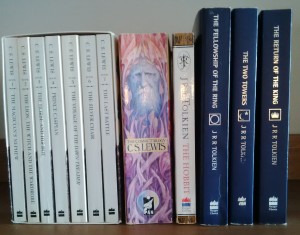My systematic theology students are reading Kevin Vanhoozer’s recent work Faith Speaking Understanding: Performing the Drama of Doctrine (Louisville: Westminster John Knox Press, 2014). In the chapter they are reading in preparation for our next class, Vanhoozer speaks of the importance of doctrine for correctly identifying Christ and allowing Christians to grow in Christ’s image. To put it in the terms of Vanhoozer’s prevailing theatrical metaphor, the chapter is about how we learn and become our part in the great cosmic drama of salvation. At one point Vanhoozer introduces an evocative quote from the writings of C.S. Lewis: Continue reading Lewis and “Little Christs”
Category Archives: Reflections
The Arrogance of Ignorance (Some Thoughts on the “New Atheists”)
“Imagine someone holding forth on biology whose only knowledge of the subject is the Book of British Birds, and you have a rough idea of what it feels like to read Richard Dawkins on theology.” As far as opening lines of a book review go, this zinger by Terry Eagleton has to be among the best ever committed to paper. Sadly for Dawkins, it also appears to be true. Continue reading The Arrogance of Ignorance (Some Thoughts on the “New Atheists”)
The Devil Goes Prime Time
The question of the existence of the devil is a notoriously difficult theological problem. On the one hand, as Carl Braaten has observed, “True Christianity is stuck with the Devil, like it or not” (“Powers in Conflict: Christ and the Devil,” in Sin, Death, and the Devil, ed. Carl E. Braaten and Robert W. Jenson (Grand Rapids: Eerdmans, 2000), 96). The devil is a recurring character in the narrative of Scripture. He is described in the New Testament as, among other things, the “prince of this world” (John 12:31), as one who “prowls around like a roaring lion looking for someone to devour” (1 Peter 5:8), and as “the strong man” whose house Jesus has come to plunder (Mark 3:27). To excise all of the references to the devil from Scripture would leave many holes in the pages of our Bibles. Continue reading The Devil Goes Prime Time
An Interesting Juxtaposition
“I’m afraid to say, but I must say it . . . I think m uch of [C.S.] Lewis’s attraction to the Protestant evangelical world lies in his individualism.”
uch of [C.S.] Lewis’s attraction to the Protestant evangelical world lies in his individualism.”
This assessment was offered by Ralph Wood, Professor of Theology and Literature at Baylor University, in a lecture delivered in Toronto in 2004 which compared the writings and sensibilities of C.S. Lewis and J.R.R. Tolkien. I had the opportunity to re-listen to the lecture this morning. Continue reading An Interesting Juxtaposition
An Unsentimental Christmas
“Sentime ntality, not atheism, is the deepest enemy of the Christian faith,” the theological ethicist Stanley Hauerwas has averred on numerous occasions. (This particular formulation is from Approaching the End (2013), 88.) Perhaps no time of year is as fraught with the danger of sentimentality for Christians as is Christmas. However, this seemingly owes more to the cultural observation of Christmas returning to its pagan roots in the winter festival of Saturnalia, then it does to the story of the Nativity. Continue reading An Unsentimental Christmas
ntality, not atheism, is the deepest enemy of the Christian faith,” the theological ethicist Stanley Hauerwas has averred on numerous occasions. (This particular formulation is from Approaching the End (2013), 88.) Perhaps no time of year is as fraught with the danger of sentimentality for Christians as is Christmas. However, this seemingly owes more to the cultural observation of Christmas returning to its pagan roots in the winter festival of Saturnalia, then it does to the story of the Nativity. Continue reading An Unsentimental Christmas
What’s Old is New Again
In September 2012, just before Apple released the iPhone 5, comedian Jimmy Kimmel took to the streets to get the opinions of passersby on the new device. The only catch was that he was not showing them the new iPhone 5, but rather the older iPhone 4s. Nevertheless, people raved about how superior the new device was to the identical device they had in their pockets or, in some cases, their other hands. I’ve used the clip in a variety of settings to illustrate the power of worldview and the enduring influence of the Myth of Progress. Continue reading What’s Old is New Again